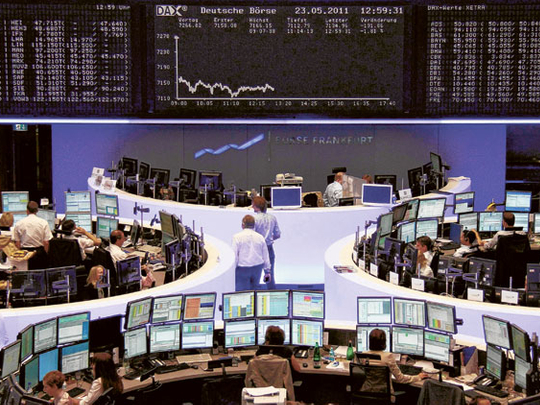
London: World stocks tumbled and safe-haven assets soared on Tuesday after North Korea fired a missile over northern Japan, fuelling worries of fresh tension between Washington and Pyongyang.
The risk-off move spread from Asia to Europe and a rally in the euro to above a key level chipped in to put regional stocks on track at one point for their biggest one-day loss in 11 months.
US stocks followed other global market indexes lower Tuesday. The prices of bonds and gold are climbing while shares of banks, energy and technology companies are skidding. The Standard & Poor’s 500 index fell 11 points, or 0.4 per cent, to 2,433 as of 10:10am. Eastern time. The Dow Jones Industrial Average declined 65 points, or 0.3 per cent, to 21,742. The Nasdaq composite dropped 30 points, or 0.5 per cent, to 6,252.
The pan-European STOXX index fell as much as 1.7 per cent to their lowest in six months before paring losses to trade down 1.3 per cent. Japan’s Nikkei hit a four-month low before paring losses to end 0.5 per cent down and South Korea’s Kospi shed as much as 1.6 per cent before ending down 0.2 per cent.
In the UAE, markets were calm. The Dubai Financial Market (DFM) index was almost flat, ending down 0.06 per cent while the Abu Dhabi Securities Exchange (ADX) general index slid 0.48 per cent.
“The North Korean escalation has triggered a significant risk-off move,” Alessandro Balsotti, head of asset management at JCI Capital Limited, said in his daily note to clients.
“However ... observers believe it won’t be enough to trigger a material reaction from the United States-South Korea axis. It wouldn’t be surprising, then, if investors take advantage of this geopolitical fear to buy the dips.” The MSCI World Index, which tracks stocks from developed economies, fell just 0.1 and remained above a five-week low hit earlier his month on jitters over North Korea, growing turmoil at the White House and a deadly attack in Spain.
North Korea has conducted dozens of ballistic missile tests under young leader Kim Jong-un, but firing projectiles over mainland Japan is his first.
The unprecedented move raised worries that the crisis could further mount, sparking a rush into safe haven assets from the Japanese yen to the Swiss franc and the German Bund.
“As a tactic to force all sides to the negotiating table it is a dangerous one that could backfire,” said Irene Goh, head of multi-asset solutions for Asia Pacific and a member of the diversified multi-asset committee at Aberdeen Asset Management.
North Korea threatened earlier this month to fire missiles into the sea near the US Pacific territory of Guam after US
President Donald Trump warned that Pyongyang would face “fire and fury” if it threatened the United States.
“Investors should look to protect themselves,” Goh added.
“The question is where to find safe shelter given how asset prices have become divorced from fundamental value ... We believe the safest spot to be is not one place, but many”.
The dollar hit its lowest level since mid-April against the yen and was last down 0.7 per cent at 108.55.
The Japanese currency tends to benefit during times of geopolitical or financial stress because Japan is the world’s biggest creditor nation and there is an assumption that Japanese investors will repatriate funds should a crisis materialise.
Also the safe-haven Swiss franc strengthened, while gold, up 0.8 per cent to $1,320 an ounce, hit its highest level in more than nine months after three straight days of gains.
The metal also drew support from uncertainty surrounding the Trump administration after remarks last week raised fears of a government shutdown.
Investors also rushed to the safety of US Treasuries, briefly pushing down the 10-year yield to its lowest since mid-November, while the yield on Germany’s 10-year government bond fell to 0.336 per cent, the lowest since end June.
In commodities, crude prices dipped as the market grappled with the shutdown of some 13 per cent of refining capacity in the US after a hurricane ripped through the heart of the country’s oil industry.
International Brent crude futures fell 0.7 per cent at $51.53 per barrel.












